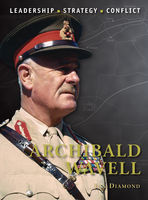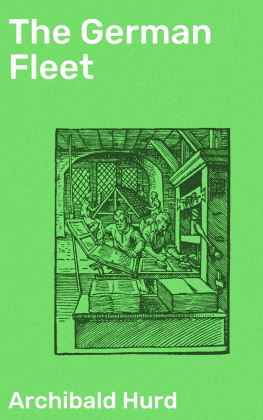Jon Diamond - Archibald Wavell
Here you can read online Jon Diamond - Archibald Wavell full text of the book (entire story) in english for free. Download pdf and epub, get meaning, cover and reviews about this ebook. genre: Non-fiction. Description of the work, (preface) as well as reviews are available. Best literature library LitArk.com created for fans of good reading and offers a wide selection of genres:
Romance novel
Science fiction
Adventure
Detective
Science
History
Home and family
Prose
Art
Politics
Computer
Non-fiction
Religion
Business
Children
Humor
Choose a favorite category and find really read worthwhile books. Enjoy immersion in the world of imagination, feel the emotions of the characters or learn something new for yourself, make an fascinating discovery.
- Book:Archibald Wavell
- Author:
- Genre:
- Rating:5 / 5
- Favourites:Add to favourites
- Your mark:
- 100
- 1
- 2
- 3
- 4
- 5
Archibald Wavell: summary, description and annotation
We offer to read an annotation, description, summary or preface (depends on what the author of the book "Archibald Wavell" wrote himself). If you haven't found the necessary information about the book — write in the comments, we will try to find it.
Archibald Wavell — read online for free the complete book (whole text) full work
Below is the text of the book, divided by pages. System saving the place of the last page read, allows you to conveniently read the book "Archibald Wavell" online for free, without having to search again every time where you left off. Put a bookmark, and you can go to the page where you finished reading at any time.
Font size:
Interval:
Bookmark:

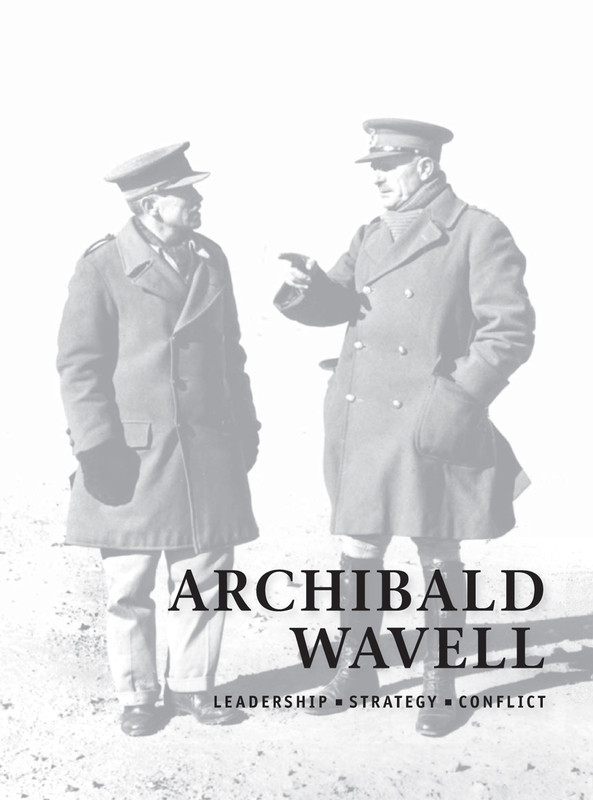
Introduction
The early years
The military life, 190040
The hour of destiny
Opposing commanders
Inside the mind
When the war is done
A life in words
Select bibliography
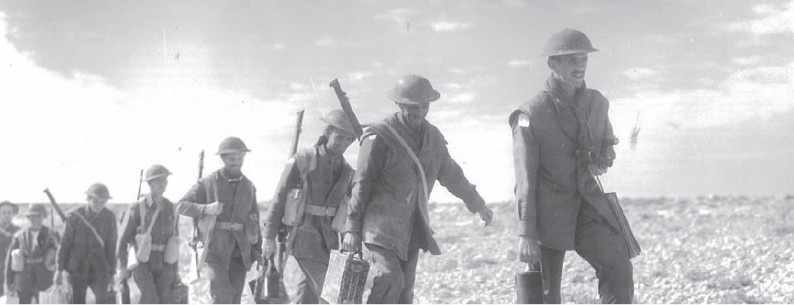
Archibald Wavell (18831950) is one of the few great commanders throughout history to have combined the keen intellect of the scholar, the artistic passion of a poet, having compiled Other Mens Flowers, and a historians understanding of the level of military science of his time. In addition, Wavell also possessed a cunning innovativeness with regard to applying new technologies to the continually developing art of warfare, along with the insight and character judgement to identify many protgs. These junior officers would refine Wavells ideas and then implement their upgraded methods, such as all-arms warfare, guerrilla tactics and strategic deception under his patient tutelage. Wavell was an ardent believer in the unorthodox methods of making war, with his experiences on General Sir Edmund Allenbys staff in Palestine during World War I providing the source of much of his inspiration.
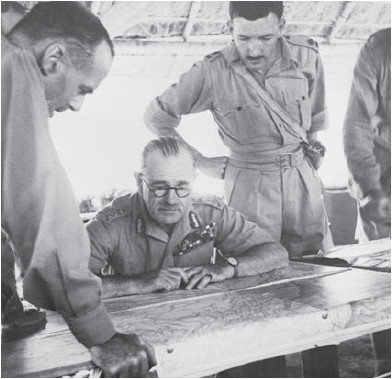
Wavell, as C-in-C, India, planning the Arakan Offensive with staff officers on the Assam/Burma border in December 1942. (IWM, IND 1525)
Despite Wavells conceptual and battlefield breakthroughs, he never forgot his regimental roots in the Black Watch and the vital role of the infantryman. Nor did he overlook his experiences during World War I, which reinforced his respect for the ordinary infantryman. As he stated, Let us be clear about three facts: first, all battles and all wars are won in the end by the infantryman. Secondly, the infantryman always bears the brunt. His casualties are heavier, he suffers greater extremes of discomfort and fatigue than the other arms. Thirdly, the art of the infantryman is less stereotyped and far harder to acquire in modern war than that of any other arm. Wavells passion for military deception and secrecy, as well as his introduction of state-of-the-art weaponry and tactics, were all designed to ensure the greatest success with the fewest casualties for his beloved infantry. Not only was Wavell an excellent trainer of troops, both during peacetime and on the battlefield, but, according to his biographer John Connell he possessed a special insight into the ideas and feelings of the private soldiers and subaltern officers who fought under his leadership and direction.
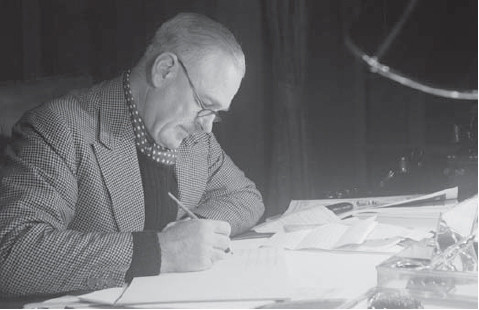
Field Marshal Wavell working at his desk in Delhi as Viceroy of India. (IWM, IB2)
In July 1939, Wavell was named General Officer Commanding-in-Chief (GOC-in-C) of Middle East Command, with the rank of full general. Few great commanders have been given the task of campaigning across such a vast stretch of territory with a military apparatus that was both antiquated and underdeveloped, owing to neglect and under-funding, along with understrength troop numbers. These were the daunting tasks facing Wavell, who between June 1940 and June 1941 was the only British theatre commander actively engaging the Axis enemy forces. His Middle East arena comprised the Western Desert (Egypt and Cyrenaica), East Africa, Greece, Crete, Syria and Iraq. No other Allied commander during World War II would have such a list of often-simultaneous operations. All of his campaigns were of unqualified difficulty owing to logistical deficiencies in the British Army, as well as the other arms, at this time of the war. Wavell, the eternal pragmatic and modest analyst, commented on this arduous campaign record some have been successful, others have failed.
The 12 months from June 1940 to June 1941 witnessed the British Expeditionary Force (BEF) being expelled from the Continent via a series of evacuations, most notably at Dunkirk. The British Isles themselves were preparing hastily for the threat of a Nazi invasion, Operation Seelwe. The sky over south-eastern England was the scene of a vicious air-battle between the Royal Air Force (RAF) and the vaunted Luftwaffe. Cities within the United Kingdom were mercilessly bombed, with London subjected to the several-month-long Blitz. The oceans and seas surrounding the British Isles were subjected to the U-boat terror. If ever there was a time for a commander to strike a blow for his country, to gain a convincing victory to uplift public morale and governmental confidence, it was now and Wavell was the only commander able to fulfil that need. It is fair to state that Wavells victories were against the Italians, Vichy French and pro-German Arab revolutionaries, and that when combatting the German Wehrmacht his campaigns often ended with disastrous consequences. However, one needs to remember that from June 1940 up to June 1941, Britain had no ally and the telling effect of the appeasement years on the British Armys lack of preparation cannot be overemphasized.
Unlike some other British generals, who rapidly advanced to major commands from relative or virtual obscurity through a combination of well-positioned mentors and serendipity, Wavells pre-war career was noteworthy for a varied number of command positions. In fact, if it were not for a matter of circumstance he might have achieved the premier rank within the British Army, Chief of the Imperial General Staff (CIGS), in 1937. Again, in contrast to other British generals during World War II, Wavell possessed a strong streak of humility, which some claim may have led him to rate some of his own best qualities lower than others did. Perhaps this facet of his personality may have contributed to his famous and formidable silences. He clearly did not suffer fools or bombastic contemporaries gladly, but rather than argue he often remained quiet. At times, this reticent stance incurred the wrath of his imperious political master, Prime Minister Winston Churchill. Wavells unspoken style when confronted by the Prime Ministers challenges or reprimands ultimately caused Churchill, perhaps without merit, to lose confidence in him. Whereas other British generals, such as Montgomery and Slim, clearly won over their subordinate officers with their glib or constructive style, Wavell has been accused of being aloof. However, these same officers remembered Wavells stalwart presence, albeit unstated, so that they affectionately referred to him as The Chief.
Archibald Wavell was born on 5 May 1883 at Colchester, the only son of Major Archibald Graham Wavell, an officer in the Norfolk Regiment in the British Army. His grandfather served in the East India Companys Bengal Army and the family origins trace back to Norman stock that lived near the bay of Vauville on the Cherbourg peninsula. Upon migrating to England, Wavells ancestors resided in Hampshire for centuries, with a progressive Anglicization of the family name Vauville to Wavell.
Wavells father served for 28 years in the Norfolk Regiment, which after 1888 was stationed in Gibraltar and India. Young Archibald Wavell thus spent the early years of his life at an army barracks in India, which left an everlasting impression on him with regard to the British Army in India and the Raj. Not many youths spend their childhood years in situations where, in the future, they would ultimately be called upon to be leaders. But so it was for Wavell, who was to become C-in-C, India, and later Governor-General and Viceroy of India. In 1891 his father took an exchange commission in the Black Watch, which, too, was going to have ramifications for young Archibalds future in the British Army. Wavell grew up within the close-knit circle of the Black Watch or as some would refer to it, as a son of the regiment. In 1894, Colonel Wavell left the command of his battalion in the Black Watch and from there went to a staff appointment and then for three-and-a-half years command of the 42nd Regimental District, a recruiting centre at Perth. In July 1898, Colonel Wavell took a staff appointment at the War Office.
Next pageFont size:
Interval:
Bookmark:
Similar books «Archibald Wavell»
Look at similar books to Archibald Wavell. We have selected literature similar in name and meaning in the hope of providing readers with more options to find new, interesting, not yet read works.
Discussion, reviews of the book Archibald Wavell and just readers' own opinions. Leave your comments, write what you think about the work, its meaning or the main characters. Specify what exactly you liked and what you didn't like, and why you think so.

